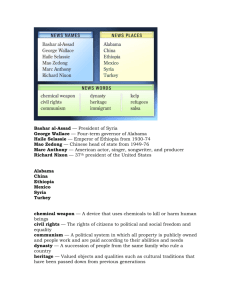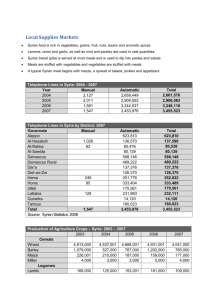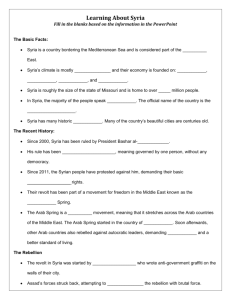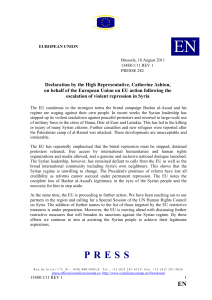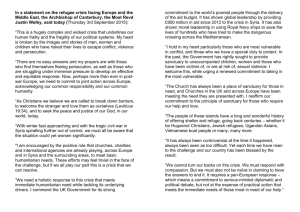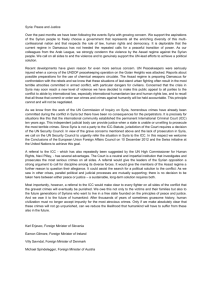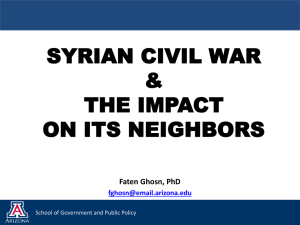Testimony “Syria-U.S. Policy Directions” Committee on Foreign Relations United States Senate
advertisement
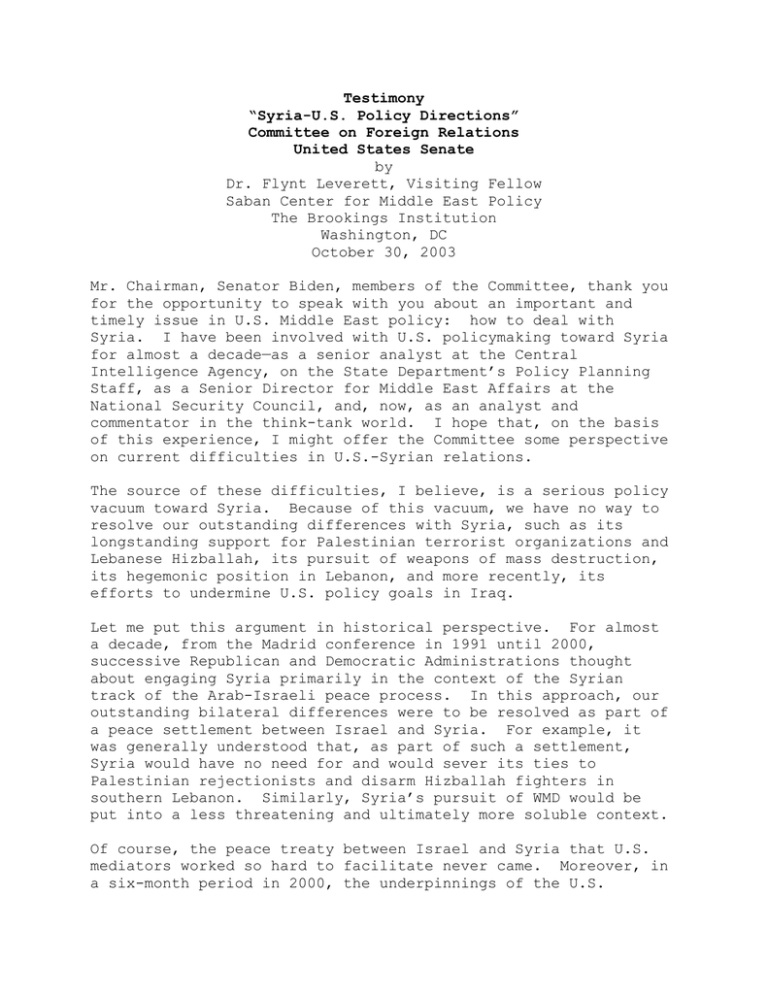
Testimony “Syria-U.S. Policy Directions” Committee on Foreign Relations United States Senate by Dr. Flynt Leverett, Visiting Fellow Saban Center for Middle East Policy The Brookings Institution Washington, DC October 30, 2003 Mr. Chairman, Senator Biden, members of the Committee, thank you for the opportunity to speak with you about an important and timely issue in U.S. Middle East policy: how to deal with Syria. I have been involved with U.S. policymaking toward Syria for almost a decade—as a senior analyst at the Central Intelligence Agency, on the State Department’s Policy Planning Staff, as a Senior Director for Middle East Affairs at the National Security Council, and, now, as an analyst and commentator in the think-tank world. I hope that, on the basis of this experience, I might offer the Committee some perspective on current difficulties in U.S.-Syrian relations. The source of these difficulties, I believe, is a serious policy vacuum toward Syria. Because of this vacuum, we have no way to resolve our outstanding differences with Syria, such as its longstanding support for Palestinian terrorist organizations and Lebanese Hizballah, its pursuit of weapons of mass destruction, its hegemonic position in Lebanon, and more recently, its efforts to undermine U.S. policy goals in Iraq. Let me put this argument in historical perspective. For almost a decade, from the Madrid conference in 1991 until 2000, successive Republican and Democratic Administrations thought about engaging Syria primarily in the context of the Syrian track of the Arab-Israeli peace process. In this approach, our outstanding bilateral differences were to be resolved as part of a peace settlement between Israel and Syria. For example, it was generally understood that, as part of such a settlement, Syria would have no need for and would sever its ties to Palestinian rejectionists and disarm Hizballah fighters in southern Lebanon. Similarly, Syria’s pursuit of WMD would be put into a less threatening and ultimately more soluble context. Of course, the peace treaty between Israel and Syria that U.S. mediators worked so hard to facilitate never came. Moreover, in a six-month period in 2000, the underpinnings of the U.S. 2 approach to the Syrian track and the management of the U.S.Syrian relationship disappeared. • • • • In March of that year, the failure of the Clinton-Assad summit in Geneva marked the collapse of the Syrian track. Two months later, in May, the IDF withdrew from southern Lebanon. A month after tha, Syrian President Hafiz al Assad died and was succeeded by his son, Bashar. In September, the intifada al Aqsa began. As a result of these events, the Bush Administration came to office with no inherited operational framework for policy toward Syria. A year later, in the aftermath of the September 11, 2001 terrorist attacks, President Bush launched our war on terror. Syria, under Dr. Bashar’s leadership, offered the United States intelligence cooperation against Al Qaida and related groups, but did nothing to reverse its own terrorist ties. In the context of a global war on terror, Syria’s status as a state sponsor of terrorism pursuing WMD capabilities has become a source of increasing friction between Washington and Damascus. Moreover, in light of the ongoing U.S. involvement in Iraq and mounting tensions between Israel and Syria, it seems clear that strained relations with Damascus complicate the pursuit of broader U.S. interests in the region. Unfortunately, the Bush Administration has had little success to date in getting Syria to modify its problematic behaviors or in cultivating a more constructive relationship with the Assad regime, despite letters and phone calls to Dr. Bashar from President Bush, personal meetings with Secretary Powell, and visits by other senior officials such as Ambassador Burns. The lack of results stems, in my view, from the policy vacuum I just described. Three years into its tenure, the Bush Administration has failed to develop a genuine strategy for changing problematic Syrian behaviors and resolving the outstanding bilateral differences between Washington and Damascus. The United States still lacks a framework for constructively engaging Syria apart from the Syrian track of the peace process. What should such a strategy look like? As I have noted in other settings since leaving government, a strategy for modifying the behavior of rogue regimes has to be rooted in hard-nosed, carrots-and-sticks engagement. We have to contrast the benefits of cooperation with the likely costs of noncooperation—in other words, to tell rogue leaders what’s in it for them if they 3 change their behavior, and make sure they understand what will happen to them if the don’t. Would such a strategy work with regard to Syria, as it has worked to move Sudan in a positive direction on terrorism and to induce Libya to meet its international obligations in the PanAm 103 case? Or, is Syria more analogous to Afghanistan under the Taliban or Saddam Husayn’s Iraq—an irredeemable regime, incapable of modifying its behavior, regardless of the incentives and disincentives put in front of it? The answers to these questions lie in an assessment of Dr. Bashar as national leader. Currently, three alternative “images” of Bashar dominate discussion and debate about Syria in the region, in Europe, and here in the United States. • • • Some believe that he is a closet reformer, hemmed in by an “old guard” he inherited, along with his position, from his father. He is not an incorrigible thug like Saddam Husayn or a religious ideologue like Mullah Omar. His wife Others see Bashar as a loyal son of both father and regime, seeking to protect Syria’s Ba’athist order; some analysts in this camp suggest that Bashar may in fact be more ideological in his approach to foreign policy than his father, perhaps under the influence of Hizballah’s Sheikh Hassan Nasrallah. A third school sees Bashar as inexperienced, unable to play the game of regional maneuvering with anything like his late father’s acumen. In reality, all three assessments contain elements of truth. • • Bashar has demonstrated some reformist impulses. He is not an ideological fanatic like Mullah Muhammad Omar or an incorrigible thug like Saddam Husayn. He is young, educated partly in the West, and married to a British-born woman who was once in J.P. Morgan’s executive training program and passed up admission to Harvard’s MBA program to marry him. Bashar has made it clear that Syria needs to modernize, and that its long-term interests would be served by better relations with the United States, but has been constrained by his father’s still-powerful retainers. Bashar can indeed fall into the most strident sort of Ba’athist, anti-American rhetoric, and he has not demonstrated much flexibility on foreign policy, where he 4 appears to be trying to follow the strategic “script” he received from his father. This script acknowledges the desirability of a better relationship with the United States but makes a strategic breakthrough dependent on meeting conditions rooted in the tensions of Syrian domestic politics. Bashar is obviously less experienced than his father, and certainly makes more than his share of mistakes. • What all of this suggests is that Bashar could be a suitable subject for diplomatic engagement, but only if engagement provides him with a clear roadmap to the desired goal and empowers him to move in that direction. It is not enough to complain about problematic Syrian behaviors: we have been doing that for 24 years, since we first sanctioned Syria as a state sponsor of terror. Instead, we must give Bashar explicit and specific targets for reversing problematic behaviors. And engagement must be backed by a set of policy tools that would impose significant costs for continued non-compliance with U.S. requirements but also promise significant benefits in the event of cooperation—in other words, carrots and sticks. There is a lot of discussion in Washington right now about new sticks in our Syria policy. But I don’t hear much discussion about carrots; indeed, the Bush Administration resists intensely any such discussion. But this leaves us with a dysfunctional policy. We must be prepared contrast the prospective costs of non-cooperation, such as economic sanctions, with the prospective gains from cooperation. Prospective gains could include: • • Syria’s removal from the list of state sponsors of terrorism, provided it expels terrorists from its territory, renews counterterrorist cooperation with the United States against Al Qaida, and broadens that cooperation to include Syria’s own terrorist links. In the 1990s, we made Syria’s removal from the list contingent on a peace treaty with Israel that never came; we should now tie removal to changes in Syria’s relations with terrorists. Taking Syria off the list would allow American economic aid to flow to the country for the first time in decades and substantially increase assistance from international financial institutions. Accommodation of Syrian interests in Iraq, if Damascus helped tackle the security problems there. This could include facilitation of Syrian-Iraqi trade and Syrian participation in Iraqi reconstruction, but should also 5 allow for a strategic dialogue between Washington and Damascus on Syria’s regional interests. The Syrian regime has had a chronic fear of regional marginalization. Following the 1991 Persian Gulf War, Syria’s principal forum for having its regional interests considered by the United States was the Syrian track. We should now indicate a willingness to begin talking with Bashar about Syria’s regional interests, but only on condition that he take steps to cut his country’s links to terrorists and begin cooperating with U.S. goals in Iraq. We should also make an exception to allow Middle East Partnership Initiative (MEPI) funding to go to NGOs in Syria. Right now, our policy does not even allow U.S. Government funds to go to civil society activists or micro-entrepreneurs in Syria because of the prohibition on any U.S. Government money going to a state sponsor of terrorism. This prevents us from engaging and empowering reformists in Syria who could support a Bashar willing to take the tough decisions we require. A smartly constructed package of carrots and sticks would empower Assad to show the regime’s inner circle and his public that Syria interests would be better served by cooperation with the United States than by continued resistance. This is the key, in my view, to a more constructive U.S. relationship with Syria. Thank you for your attention.
